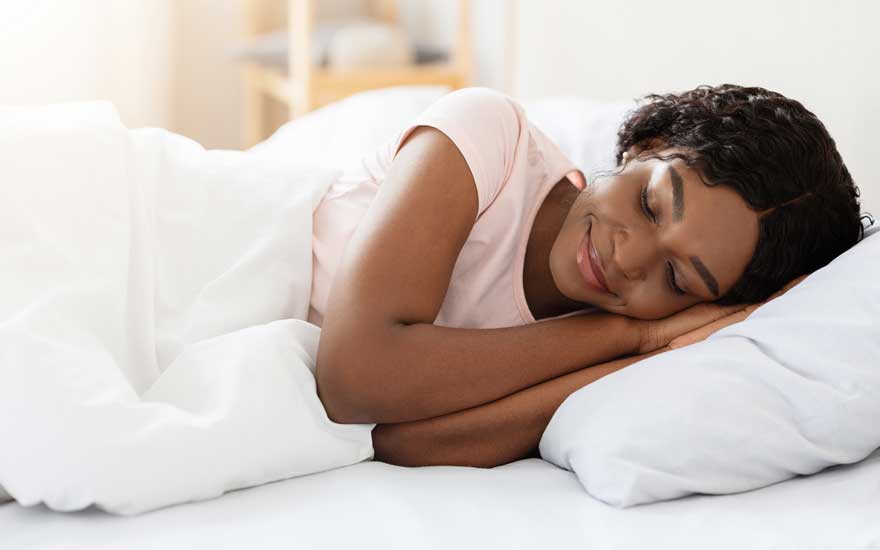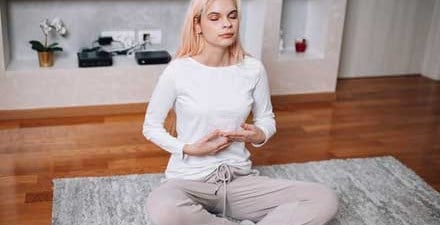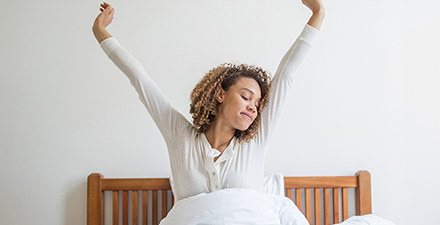
Let’s talk about sleep. Sleep is essential for our physical health and mental and emotional well-being. We need it to refresh the mind and heal the body; we love it, we crave it, and when we’re not getting it, we’re miserable.
Proper sleep duration and quality are critical for the proper functioning of the body. Physical therapists play a role in both the prevention and management of sleep impairments and in promoting healthy sleep behaviors (also called sleep hygiene). Research suggests that exercise is a safe and useful strategy for regulating sleep.
Physical therapists also can help address sleep disorders by assessing sleep positioning for people who have pain or discomfort, as well as other factors that prevent them from falling asleep.
You've probably heard that to function optimally, adults should get seven to nine hours of sleep every night. And maybe you've laughed at that and said to yourself, "Whoever declared that doesn't have any idea what it's like to be balancing everything I've got going on!"
I hear you on this one. But when I wake up in the morning after eight hours of solid sleep, I am a radically different human being. I can feel the difference in my body, in my mind, and in my mood.
Getting the sleep you need is a combination of getting enough hours and preparing yourself for sleep so that you go to sleep quickly and sleep soundly. To get the most out of any amount of time in bed, here are some tips from the Sleep Foundation and the Mayo Clinic.
My suggestion is to just start with one. Commit to a single change for one week and see what subtle shifts you notice, then add another change each week and see if your sleep improves.
- Have your last bite to eat at least two hours before bed. Be aware that it’s difficult to sleep with a full stomach, and you may wake up in the middle of the night needing to use the bathroom. Instead, consider dinner the last meal of the day, with no post-dinner snacks. That will help give your body two full hours of digestion before you hit the pillow.
- Turn off all screens at least 30 minutes before bed. The specific wavelengths of light that screens emit — phones, TVs, and tablets — block melatonin, one of the key hormones involved in sleep. Melatonin is at low levels during the day and begins being released a few hours before bedtime as part of the natural circadian rhythm of our systems. We can't fall asleep without that natural rise in melatonin at night. So if you're blocking melatonin by staring at screens right before bed, you're going to have a tough time falling asleep.
- Be wary of blue light, but not too wary. While it’s good to limit blue light exposure from screens at night, you can actually benefit from it during the day. “Blue light in the morning helps you keep your circadian clock in sync with your watch,” says Mariana Figueiro, PhD, who studies how light affects human health and has published several studies on the topic.
Think of it like a cup of coffee. “Blue light in the morning can be beneficial to help you feel alert, but you don’t want to have it late in the evening before bedtime,” she explains. And keep in mind that blue light doesn’t just come from screens.
Natural sunlight also contains blue light, and all types of light have alerting effects. “Morning light provides the most benefit in terms of avoiding circadian disruption that can lead to depression, anxiety, and insomnia,” says Figueiro. “Even on a cloudy day, you can get more light outdoors than indoors.” So head out for a 30-minute morning walk. - Limit naptime. If you have to nap during the day, limit your naps to 20 minutes. Or better yet, take up meditation instead. It’s a more efficient way to rest and recharge, and it won’t leave you feeling sluggish. Try starting with a five- or 10-minute guided meditation during any afternoon slump when you feel drowsy. Look for one that’s good for focus or energy. See Meditation Methods that Can Improve Insomnia for tips on the practice.
- Keep the use of the bed traditional. Try not to work from bed, watch television in bed (very stimulating), and when it’s time for sleep, have no screens visible (put phones face down).
- Choose just one thing you’re going to do before bed. I get so excited about me-time in the evening. I tend to think that I can do 10 things in 1 ½ hours. But that's just not possible. Instead, I end up pushing my bedtime later and later. So choosing just one thing on my personal to-do list helps make sure that I don't stay up too late.
- Follow a wind-down routine. Try creating a bedtime ritual that helps you unwind and prepare for mental rest. For example: shower, brush and floss teeth, meditate, sleep. Or stretch, bathe, read, then sleep. When you repeat the same routine nightly, you’re sending a cue to the mind and body that it’s time to transition from awake-time to sleep-time, making it much easier to fall asleep.
- Go to bed and wake up at the same time every day. A 2011 study published in the journal Chronobiology International found that consistent, regular bedtimes and rise times make it easier for participants to fall asleep and also help improve the quality of that sleep. And the results showed that continuing to wake up at the same time on weekends as on weekdays made participants less likely to feel sleepy during the week and increased the duration of their weekday slumber.
Sleep scientist Matt Walker, who founded the Center for Human Sleep Science and is a professor of neuroscience and psychology at the University of California, says keeping a regular bedtime is one of the top things that you can do to improve sleep. If you usually operate on an “I’ll go to bed when I go to bed” mentality, it might be time to rethink that strategy. Instead, pick a bedtime you can stick to night after night. - Make sure your bedroom is dark and cool in the evening. For the same reason that light helps wake you up, light at night can prevent you from falling asleep easily. “If we don’t have a natural light-dark cycle, sleep can be disrupted,” says Kate Huether, MD, who received her medical degree from Johns Hopkins University, a master's degree in nutrition from Columbia University, and focuses her practice on lifestyle medicine and preventive care. Your circadian rhythm is counting on that light in the morning to wake up but also less of it at night in order to fall asleep.
But what about the temperature? According to the National Sleep Foundation, the best room temperature for getting better sleep is between 60 and 67 degrees. As Huether hinted at earlier, your body initiates sleep by lowering its core body temperature. After taking a warm bath, your body’s core temperature will drop, sending the signal that it’s time to sleep. Same idea with a cool bedroom. - Consider that booze is hurting more than it’s helping. It’s a common misconception that having a few drinks is a good idea when you can’t sleep. Sure, it will help you zonk out, but that’s not the full picture. “Alcohol does, in fact, make you sleepy and triggers the onset of sleep through adenosine production,” explains Huether. “However, this adenosine production is abruptly stopped after a few hours, causing premature waking.” In short, a few drinks may help you fall asleep, but they won’t help you stay asleep and may cut into your overall sleep quality.
- Time your exercise right. Overall, fitting regular exercise into your lifestyle is thought to benefit sleep quality. However, exercising too close to bedtime can have the opposite effect. Huether explains that’s because exercise increases your cortisol levels, a stress hormone that can trigger a stress response. “Our cortisol is highest in the morning and then decreases throughout the day,” she says.
Instead of spiking cortisol levels again when your body naturally wants to relax at night, try to avoid exercise at later hours. “Exercising first thing in the morning is generally the best when it comes to sleep,” she says. If you’re craving movement in the evening, try routines that relax your nervous system. - Evaluate your relationship with caffeine. We know that drinking caffeine or alcohol at night can interfere with sleep. But for some people, your morning cup of Joe could also be a culprit. Huether explains that caffeine’s half-life is three to five hours, which is how long it takes to decrease by half in your body. “Whatever is left could remain in your system, depending on how quickly your body metabolizes it,” she says. I know that no coffee is a scary thought. But if you’re having trouble sleeping and you’ve tried everything else, you may want to replace your morning coffee with herbal tea.
- Do restorative stretching. Holding deep, restorative stretches is another way to help your body relax. Tiffany Grimm, director of learning and development at Exos and a registered yoga instructor and certified personal trainer, explains that it’s deeply restorative for the nervous system. Holding stretches and controlling your breathing help activate your parasympathetic nervous system so your body (and brain) get the message that it’s time to be calm and relax.
According to Grimm, by breathing deeply through certain stretches, you create a draping effect in the body, and with every breath, the muscles release grip and tension. This allows you to relax deeply, and the fact that you’re holding the poses for a few minutes each helps create a sort of meditative state as well. She recommends trying to hold these stretches and poses for two to three minutes:
-
- Legs up the wall.
- Pigeon pose.
- Thigh stretches like a low lunge.
- Child’s pose.
Pick just one of these ideas and try it for the next week. You may be surprised by how much a small change in your routine can make a big difference in your energy levels.
Physical therapists are movement experts. They improve quality of life through hands-on care, patient education, and prescribed movement. You can contact a physical therapist directly for an evaluation. To find a physical therapist in your area, visit Find a PT.


